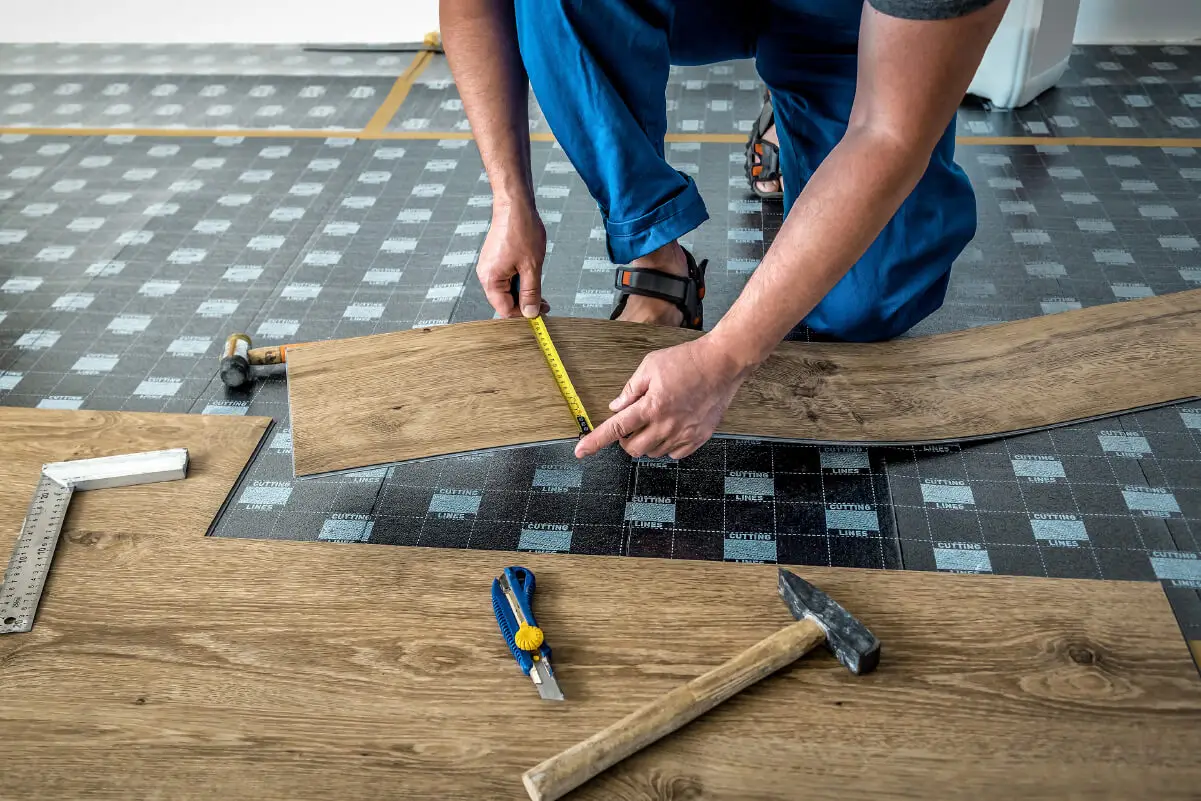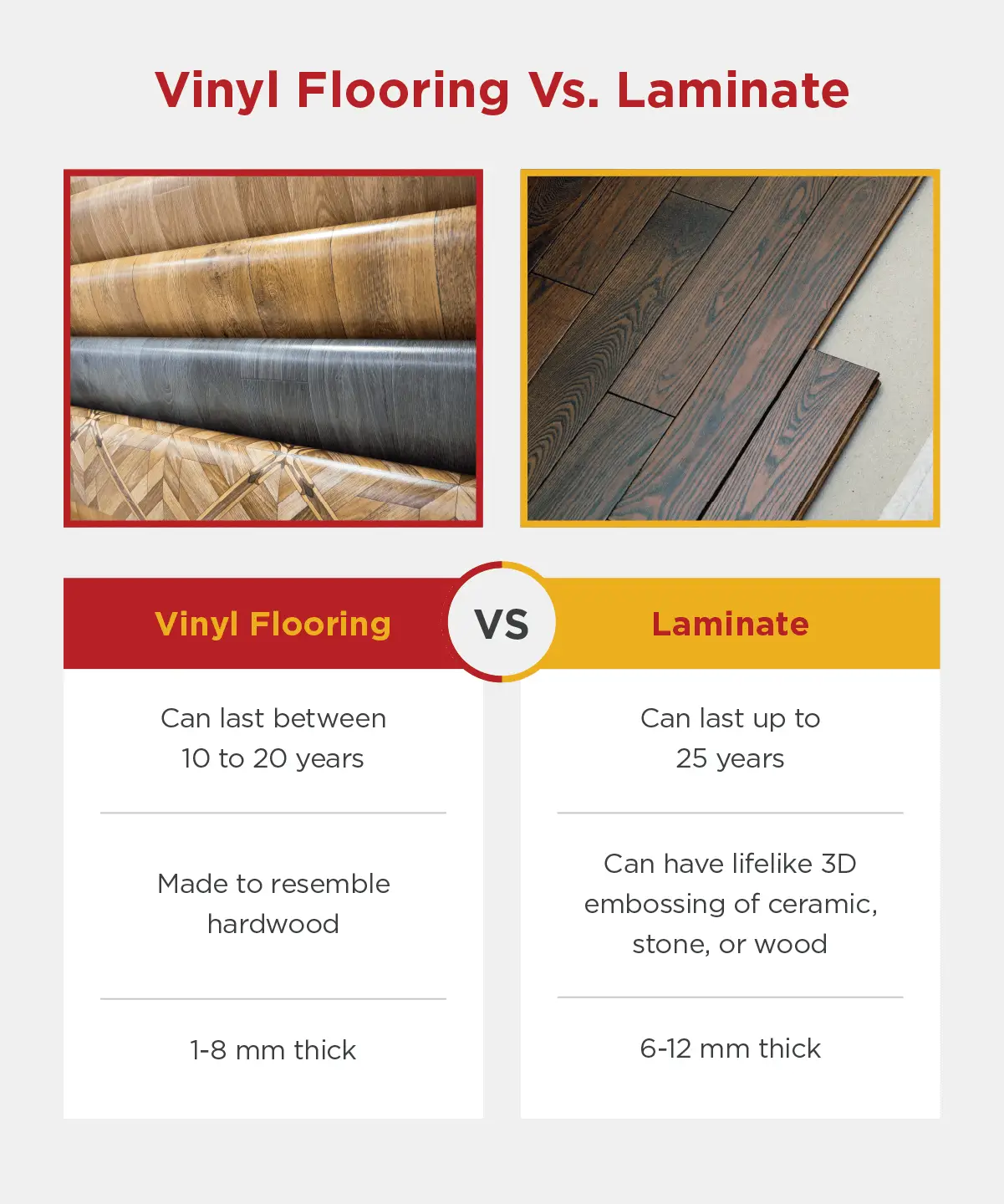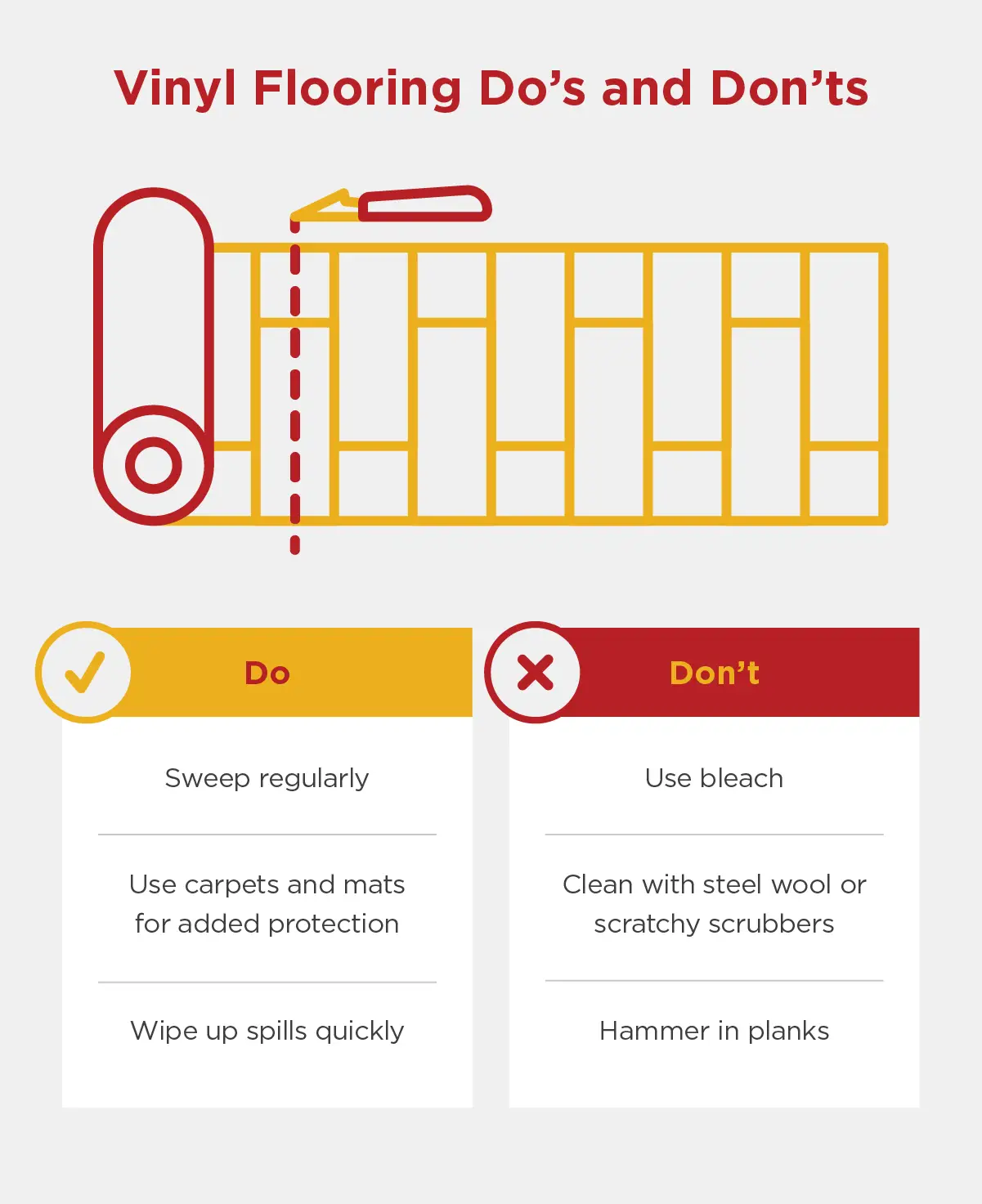What Is Vinyl Flooring and How Does It Compare to Laminate?

|
Quick answer: Vinyl flooring is a synthetic material known for its durability and affordability. It comes in various colors and sizes, making it one of the most versatile flooring materials on the market. |
Tired of hardwood floors that can’t withstand spills and scratches? Vinyl flooring may be the answer. But what is vinyl flooring? Vinyl is a synthetic material often confused with other types of flooring that’s durable, affordable, and easy to install. Plus, it holds up in moist environments, and can have a realistic wood plank and stone tile appearance. Mosy often, luxury vinyl planks are confused with laminate.

Types of Vinyl Flooring
Vinyl flooring comes in many forms, making it one of the most versatile flooring materials on the market. Some of the most popular variations for vinyl flooring are:
- Click vinyl tiles: These interlocking tiles can be placed over a wood subfloor, connecting like puzzle pieces.
- Vinyl sheet flooring: This type of vinyl is draped across the subfloor like a blanket and then trimmed down to fit. You’ll need to lay adhesive tape to hold the vinyl sheet in place.
- Self-adhesive vinyl tiles: This variation, also known as peel-and-stick tiles, works like a set of giant stickers that you place directly over the subfloor.
- Glue-down vinyl tiles: Here, you’ll apply a thin adhesive film to the floor before laying and flattening your vinyl tiles.
- Loose lay vinyl planks: Loose lay planks require the least amount of adhesive; simply place planks side by side after removing a layer of peel-off backing from each plank.
- Luxury vinyl plank (LVP): Luxury vinyl plank flooring is a cost-friendly option that emulates wood and utilizes a click-lock installation system.
- Luxury vinyl tile (LVT): Primarily sold as a peel-and-stick material, LVT is spill-resistant and fairly durable.
Vinyl Flooring Pros
People love vinyl flooring for many reasons.
- Vinyl can be a more affordable option compared to hardwood flooring. On average, vinyl costs $2 to $7 per square foot while hardwood can cost $6 to $12 per square foot.
- It comes in many attractive textures, colors, and styles to match just about any room.
- Vinyl flooring comes in sheets, tiles, and planks, which makes installation easier.
- It’s also a great flooring option for bathrooms or laundry rooms since it won’t stain and withstands humidity well.
Vinyl Flooring Cons
However, vinyl flooring also has some drawbacks.
- The manufacturing process uses toxic chemicals, and vinyl may release volatile organic compounds (VOCs) after installation.
- It’s difficult to repair if something punctures or scratches the floor. You’ll need a chemical stripper and buffer to refinish this material.
What Is the Difference Between Laminate and Vinyl Flooring?
Laminate flooring contains some wood, which makes it vulnerable to moisture and humidity. This material has a wood fiberboard core with an image of wood grain sealed beneath a clear protective layer.
All these layers are laminated together to provide a more rigid flooring material. Laminate flooring is typically sold in planks that snap together for the look and feel of hardwood floors.
In contrast, vinyl is made of plastic and resists excess moisture more effectively than laminate. Viny is also normally between 1 and 8 millimeters thick while laminate ranges from 6 to 12 millimeters.
What’s the Difference Between Vinyl and Linoleum?
Linoleum is an eco-friendly flooring option that has been used for almost 150 years. It’s a great choice for those who want an all-natural and affordable flooring option. Linoleum isn’t as soak-resistant as waterproof vinyl flooring but it can last longer if properly cared for.
While vinyl is mostly maintenance-free beyond general sweeping and mopping, linoleum requires an annual protective coating and waxing, which boosts its longevity. Linoleum is slightly more expensive than vinyl and is typically used in commercial spaces.

Get Professional Flooring Installation From Mr. Handyman®
Have you found the perfect vinyl flooring for your home? While DIY installation is straightforward, it does take a careful eye and some patience. When vinyl flooring fails prematurely, it’s usually due to improper installation.
If you’d rather spend your free time doing something else and want to ensure your flooring lasts, Mr. Handyman’s professional vinyl flooring installation services can help. Give us a call or request service today and take one step closer to your new floors!
This article is intended for general informational purposes only and may not be applicable to every situation. You are responsible for determining the proper course of action for your home and property. Mr. Handyman is not responsible for any damages that occur as a result of this blog content or your actions. For the most accurate guidance, contact your local Mr. Handyman location for a comprehensive, on-site assessment.
Vinyl Flooring FAQs
Mr. Handyman has been helping homeowners repair, maintain, and enhance their spaces for over 25 years! We are the one-stop solution for everything on your to-do list. This includes answering your questions about home repairs, maintenance, and improvements. Here are answers to some of your most frequently asked questions about vinyl flooring.
How long do vinyl floors last?
Vinyl generally has an expected lifespan of 10 to 20 years if well-maintained. The best vinyl plank flooring option for longevity is generally luxury vinyl plank (LVP) due to its higher-quality manufacturing process. You’ll get the most bang for your buck if your flooring is properly installed and kept from extreme temperatures.
Is vinyl waterproof?
Vinyl isn’t 100% waterproof, but it is highly resistant to spills. So long as you quickly remove any liquid from the surface, you aren’t likely to experience much damage.
What factors should you include before installing vinyl flooring?
Vinyl may be the best choice for your living situation if you consider:
- Cost: Vinyl is very cost-friendly, at $2 to $7 per square foot.
- Installation: Vinyl’s easy installation makes it suitable for various homes, apartments, and offices.
- Lifestyle: If you have pets or children, Vinyl’s durability and easily cleanable surface are great benefits.
- Style: Vinyl comes in multiple patterns and styles that can suit almost any aesthetic.
 Click to call
Click to call


